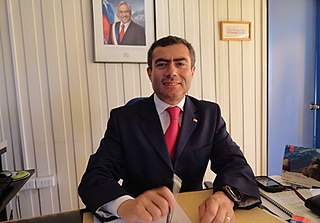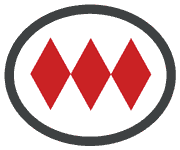Contents
This article needs additional citations for verification .(February 2024) |
| |||||
| Decades: | |||||
|---|---|---|---|---|---|
| See also: | |||||
Events in the year 1879 in Chile.
This article needs additional citations for verification .(February 2024) |
| |||||
| Decades: | |||||
|---|---|---|---|---|---|
| See also: | |||||
Events in the year 1879 in Chile.

Pedro Abelino Aguirre Cerda was a Chilean political figure, educator, and lawyer who served as the 22nd president of Chile from 1938 until his death in 1941. A member of the Radical Party since 1906, he was chosen by the left-wing Popular Front coalition as its candidate for the 1938 presidential election and won. He had previously served as deputy for San Felipe, Putaendo and Los Andes from 1915 to 1918, Minister of the Interior from January to September 1918 under president Juan Luis Sanfuentes, deputy for Santiago from 1918 to 1921, Minister of Justice and Public Instruction from 1920 to 1921 under president Arturo Alessandri, and senator for Concepción from 1921 to 1927. He died two years and eleven months into his presidency on November 25, 1941, at the age of 62, from tuberculosis.

Presidential elections were held in Chile on February 1, 1942. The result was a victory for Juan Antonio Ríos of the Radical Party, who received 56% of the vote.

Pedro Aguirre Cerda is a commune of Chile located in Santiago Province, Santiago Metropolitan Region. It is named after President Pedro Aguirre Cerda.

The Radical Party was a Chilean political party. It was formed in 1863 in Copiapó by a split in the Liberal Party. Not coincidentally, it was formed shortly after the organization of the Grand Lodge of Chile, and has maintained a close relationship with Chilean Freemasonry throughout its life. As such, it represented the anticlericalist position in Chilean politics, and was instrumental in producing the "theological reforms" in Chilean law in the early 1880s. These laws removed the cemeteries from the control of the Roman Catholic Church, established a civil registry of births and death in place of the previous recordkeeping of the church, and established a civil law of matrimony, which removed the determination of validity of marriages from the church. Prior to these laws, it was impossible for non-Catholics to contract marriage in Chile, and meant that any children they produced were illegitimate. Non-Catholics had also been barred from burial in Catholic cemeteries, which were virtually the only cemeteries in the country; instead, non-Catholics were buried in the beaches, and even on the Santa Lucia Hill in Santiago, which, in the 19th century, functioned as Santiago's dump.
The Ariostazo occurred on August 25, 1939, and was a brief revolt of the Tacna artillery regiment, led by General Ariosto Herrera, in what turned out to be a non-violent attempt against the government of Chilean President Pedro Aguirre Cerda.
The Popular Front in Chile was an electoral and political left-wing coalition from 1937 to February 1941, during the Presidential Republic Era (1924–1973). It gathered together the Radical Party, the Socialist Party, the Communist Party, the Democratic Party and the Radical Socialist Party, as well as organizations such as the Confederación de Trabajadores de Chile (CTCH) trade-union, the Mapuche movement which unified itself in the Frente Único Araucano, and the feminist Movimiento Pro-Emancipación de las Mujeres de Chile (MEMCh).

Jerónimo Méndez Arancibia was a Chilean politician who served as provisional president.
Cerda may refer to:

Juana Rosa Aguirre Luco was First Lady of Chile and the wife of President Pedro Aguirre Cerda, who was also her cousin.

Julio Diego Ibarra Maldonado is a Chilean politician. Ibarra was the Governor of Cardenal Caro Province since he was appointed by President of Chile Sebastián Piñera on March 16, 2010. He left office on March 12, 2014.

Santiago Metro Line 6 is a line on the Santiago Metro, Santiago, Chile. It connects the commune of Cerrillos, in the south west of the city, with Providencia in the east of the city, where most economic activity is concentrated. It has 10 new stations on 15.3 km (9.5 mi) of track. Its distinctive color on the network line map is purple.
The following lists events that happened during 1938 in Chile.
The following lists events that happened during 1939 in Chile.
The following lists events that happened during 1940 in Chile.
The following lists events that happened during 1941 in Chile.
The following lists events that happened during 1955 in Chile.

Enrique Sorrel Contreras was a Chilean footballer and manager.
Aguirre is a surname of Basque origin. It shows different variants and composite surnames, meaning 'prominent' or 'exposed prominence/place'. Lope de Aguirre was one of the first Europeans to explore the Americas. Based on "the U.S. Census Bureau's 1990 and 2000 censuses," HowManyofMe.com estimates in mid-2013 that 68,990 people bear the surname Aguirre in the United States, making the name statistically the country's 508th most common surname.

President Pedro Aguirre Cerda Station was a Chilean Antarctic base, located at Pendulum Cove in Deception Island in the South Shetland Islands, inaugurated in 1955. The same year, the Falkland Islands and Dependencies Aerial Survey Expedition was established at Deception Island to help the survey of the Antarctic Peninsula, operating aircraft from Hunting Aerosurveys Ltd.

Oscar Alex Enrique Schnake Vergara was a Chilean politician and physician. He was a founder member of the Chilean Socialist Party and close to President Pedro Aguirre Cerda (1938–1941).